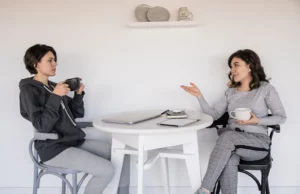In a society that highly values romantic relationships, it’s easy to overlook the depth and importance of platonic bonds. These friendships, just like any other relationships, have their unique challenges that need addressing to ensure their longevity. Through this lens, we introduce a novel concept – employing couples therapy strategies for friends. This isn’t about changing the nature of your friendship, but about enhancing the connection, understanding, and respect between two friends. As we navigate this enlightening terrain, we’ll uncover how the principles of couples counseling for friends can help fortify, ensuring they stand the test of time.
Contents
Should Friends Go To Couples Therapy?
 Yes, friends can certainly benefit from going to couples therapy or therapy specifically designed for friendships. Like any relationship, friendships can experience conflicts, misunderstandings, and periods of disconnection that can strain the bond. Traditional friendship advice might not always be enough to resolve deep-seated issues or recurring patterns of conflict. That’s where therapy comes in.
Yes, friends can certainly benefit from going to couples therapy or therapy specifically designed for friendships. Like any relationship, friendships can experience conflicts, misunderstandings, and periods of disconnection that can strain the bond. Traditional friendship advice might not always be enough to resolve deep-seated issues or recurring patterns of conflict. That’s where therapy comes in.
Therapists, including those specializing in couples therapy, are trained to help people navigate complex emotional landscapes and improve their communication skills. When applied to a friendship, these professionals can help friends gain new insights into their relationship, understand each other better. And develop healthier ways of relating to one another.
When To Consider Couples Counseling For Friends?
Couples counseling for friends can be considered in several circumstances:
- Persistent Conflicts: If you find that your disagreements are frequent, repetitive, or escalating, and you’re unable to reach a resolution. Then, therapy may provide an impartial perspective to help navigate the situation.
- Communication Breakdowns: If conversations often lead to misunderstandings, or there’s an avoidance of certain topics due to fear of conflict. Then, therapy can help to improve communication and promote understanding.
- Feelings of Distance or Disconnection: If you feel you’ve drifted apart, or the level of closeness has changed. Then, you can consider this counseling to help in reconnecting and restoring the bond.
- Trust Issues: If trust has been broken, perhaps due to a betrayal or a series of smaller breaches.
- Significant Life Changes: Major transitions like moving away, getting married, having children, or career changes can strain a friendship. A therapist can help navigate these shifts and the feelings associated with them.
- Difficulty with Boundaries: Therapy can provide tools and strategies for addressing these issues, if you’re struggling with setting or respecting boundaries,.
- When a Friendship Impacts Mental Health: If your friendship is causing stress, anxiety, or depression, it’s crucial to seek professional help. A therapist can guide you through ways to handle the situation while prioritizing your mental well-being.
Remember, there’s no “right” time or reason to seek therapy. If you believe your friendship could benefit from professional insight, it might be worth exploring couples counseling as a path to healing and growth.
Couples Counseling Techniques Adapted for Friendship
 Couples counseling techniques can be quite useful when adapted for friendships. Here are a few key strategies:
Couples counseling techniques can be quite useful when adapted for friendships. Here are a few key strategies:
- Active Listening: One of the foundations of effective communication, active listening involves fully focusing on, understanding, and responding to your friend. It shows respect for their viewpoint and helps clarify any misunderstandings.
- Emotionally Focused Therapy (EFT): EFT can help friends understand and reorganize their emotional responses to one another. By fostering a greater understanding of each other’s emotions, friends can empathize more deeply and build a stronger bond.
- Cognitive-Behavioral Therapy (CBT): This technique helps to identify and change negative thought patterns that lead to harmful behaviors or feelings. Adapted for friendships, it can assist friends in dealing with conflicts and negative feelings towards each other more healthily.
- Solution-Focused Brief Therapy (SFBT): This approach is future-focused and helps individuals to develop solutions for their problems rather than dwell on past issues. In a friendship context, it can assist friends in finding effective solutions to their conflicts and disagreements.
- Narrative Therapy: This technique helps individuals to separate themselves from their problems, allowing them to view issues in a different, more objective light. When adapted for friends, it can provide new insights into conflicts and challenges in the friendship.
- Setting Boundaries: Just like in a romantic relationship, it’s important for friends to establish boundaries. A therapist can guide friends in understanding and communicating their personal boundaries effectively.
These methods, under the guidance of a professional, can effectively support friends in strengthening their bond. And navigating through any challenging situations they might encounter.
Can Two Friends Have The Same Therapist?
Yes, two friends can indeed have the same therapist, particularly in the context of relational or group therapy. This could occur in various formats such as couples therapy, where the same principles are applied to a friendship. The key benefit here is that the therapist can mediate conversations, help friends understand each other’s perspectives better, and facilitate the development of healthier communication patterns.
In this context, the therapist acts as a neutral third party who can guide both friends through their challenges. And provide tools and strategies for improving the relationship.
However, it’s also important to note that there are ethical considerations in this scenario. The therapist must ensure that they can maintain impartiality. And not allow any information or relationship from individual therapy sessions to influence their guidance during joint sessions. Ultimately, the specific circumstances and needs of the friends, along with the professional judgement of the therapist, would guide the decision.
Pros And Cons Of Couples Counseling For Friends
 Couples counseling techniques, when used appropriately, can be quite beneficial for friendships. However, like any therapeutic approach, there are both advantages and potential drawbacks to consider.
Couples counseling techniques, when used appropriately, can be quite beneficial for friendships. However, like any therapeutic approach, there are both advantages and potential drawbacks to consider.
Pros
- Improved Communication: One of the main benefits of counseling is the enhancement of communication skills. Friends can learn to express their feelings and thoughts more effectively and listen more attentively to one another.
- Conflict Resolution: Therapists can provide strategies for resolving conflicts, making disagreements less damaging and more constructive.
- Increased Empathy and Understanding: Through therapy, friends can gain a deeper understanding of each other’s perspectives. And leading to increased empathy and a stronger bond.
- Better Boundaries: A therapist can guide friends in understanding and setting healthy boundaries. That is crucial for any long-lasting relationship.
- Healing Past Hurts: Therapy offers a safe environment to address past conflicts or hurts that might be affecting the present friendship.
Cons
- Time and Cost: Therapy requires a commitment of time and resources. Depending on the frequency and duration of sessions, as well as the therapist’s rates, this can be expensive.
- Potential for Increased Conflict: Initially, therapy may bring to light issues that were previously unaddressed. This leads to increased tension or conflict. However, with continued therapy, these issues can usually be worked through.
- Finding the Right Therapist: Not every therapist may be the right fit for both friends. It might take some time to find a professional who works well with both individuals.
- Risk of Dependency: There’s a potential risk that friends may become overly reliant on the therapist to resolve conflicts or make decisions, which could inhibit their ability to manage disagreements independently in the future.
- Privacy Concerns: For therapy to be effective, friends must be open and honest about their feelings. This level of vulnerability may be uncomfortable for some, and there’s always the risk of disclosed information impacting the relationship.
In weighing these pros and cons, it’s crucial to remember that the success of therapy depends significantly on the individuals involved and their willingness to engage in the process. Open communication, mutual respect, and a shared commitment to improving the friendship are key factors that can help overcome any potential drawbacks.
Conclusion
In conclusion, couples counseling for friends can be a valuable tool, especially for those who wish to deepen their bond, resolve conflicts, and navigate their relationship more effectively. Much like romantic relationships, friendships require nurturing, understanding, and effective communication to thrive. The application of couples therapy to friendships may initially seem unusual. But its principles are fundamentally about improving relational dynamics. That is as crucial in friendships as in romantic partnerships.
So, if you value your platonic relationships and are keen on enriching them. Then, this counseling for friends may be a path worth exploring. Addressing and resolving a couple of issues is essential for a strong and lasting partnership. If you have any queries regarding Online Couple Counseling experienced therapists at CoupleMantra can help. Book a trial couple therapy session.


